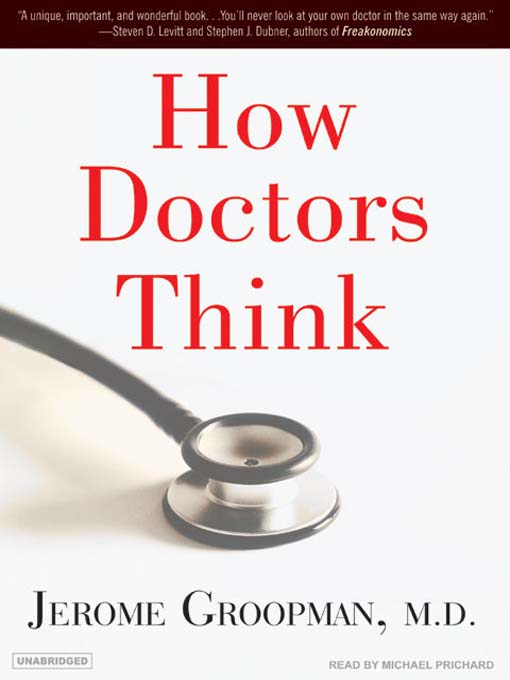
How Doctors Think
فرمت کتاب
audiobook
تاریخ انتشار
2007
نویسنده
Michael Prichardناشر
Tantor Media, Inc.شابک
9781400174256
کتاب های مرتبط
- اطلاعات
- نقد و بررسی
- دیدگاه کاربران
نقد و بررسی

Yes, we hear about how doctors think, but Dr. Groopman's lessons encourage everyone to examine how they reason and come to conclusions. Using engaging patient histories and simple language to explain complicated medical concepts, the author makes his instruction in cognition pleasant to hear and easy to understand. Michael Prichard adapts his narration to make himself sound interesting and interested. His reading rhythm and pace find just the right combination to make every word audible and understandable. Although he fluffs the pronunciations of a few medical terms, no one but a physician will notice. The fact that Prichard doesn't sound scientific may increase the audiobook's appeal to general readers who want to improve their ability to think logically when making decisions. J.A.H. (c) AudioFile 2007, Portland, Maine

Starred review from January 29, 2007
Signature
Reviewed by
Perri Klass
I wish I had read this book when I was in medical school, and I'm glad I've read it now. Most readers will knowJerome Groopman from his essays in the New Yorker
, which take on a wide variety of complex medical conditions, evocatively communicating the tensions and emotions of both doctors and patients.
But this book is something different: a sustained, incisive and sometimes agonized inquiry into the processes by which medical minds—brilliant, experienced, highly erudite medical minds—synthesize information and understand illness. How Doctors Think
is mostly about how these doctors get it right, and about why they sometimes get it wrong: "ost errors are mistakes in thinking. And part of what causes these cognitive errors is our inner feelings, feelings we do not readily admit to and often don't realize."
Attribution errors happen when a doctor's diagnostic cogitations are shaped by a particular stereotype. It can be negative: when five doctors fail to diagnose an endocrinologic tumor causing peculiar symptoms in "a persistently complaining, melodramatic menopausal woman who quite accurately describes herself as kooky." But positive feelings also get in the way; an emergency room doctor misses unstable angina in a forest ranger because "the ranger's physique and chiseled features reminded him of a young Clint Eastwood—all strong associations with health and vigor." Other errors occur when a patient is irreversibly classified with a particular syndrome: "diagnosis momentum, like a boulder rolling down a mountain, gains enough force to crush anything in its way."
The patient stories are told with Groopman's customary attention to character and emotion. And there is great care and concern for the epistemology of medical knowledge, and a sense of life-and-death urgency in analyzing the well-intentioned thought processes of the highly trained. I have never read elsewhere this kind of discussion of the ambiguities besetting the superspecialized—the doctors on whom the rest of us depend: "Specialization in medicine confers a false sense of certainty." How Doctors Think
helped me understand my own thought processes and my colleagues'—even as it left me chastened and dazzled by turns. Every reflective doctor will learn from this book—and every prospective patient will find thoughtful advice for communicating successfully in the medical setting and getting better care.
Many of the physicians Dr. Groopman writes about are visionaries and heroes; their diagnostic and therapeutic triumphs are astounding. And these are the doctors who are, like the author, willing to anatomize their own serious errors. This passionate honesty gives the book an immediacy and an eloquence that will resonate with anyone interested in medicine, science or the cruel beauties of those human endeavors which engage mortal stakes. (Mar. 19)
Klass is professor of journalism and pediatrics at NYU. Her most recent book is
Every Mother Is a Daughter, with Sheila Solomon Klass.

July 30, 2007
Drawing on both personal experience and extensive field research, Dr. Groopman sheds light on the faulty decision making that leads otherwise competent physicians down the wrong path in diagnosing and treating their patients. Groopman stresses the imperative for his colleagues to balance clinical formulas and data with keen insight and for patients to engage their physicians in active dialogue. Like the heroic fictional doctors in prime-time television medical dramas, Groopman advances a humane, patient-focused agenda that flies in the face of the bureaucratic, institutional establishment, but refreshingly, he manages to steer clear of pat answers and smug solutions that characterize much of the popular media's take on health care. With more than 450 titles under his belt, accomplished narrator Michael Prichard exhibits a calm, authoritative command of the material. His less-is-more approach to conveying emotion may strike some listeners as detached and lacking passion, but his steady performance fits nicely with Groopman's sensitive—but still highly inquisitive—exploration of life and death questions. Simultaneous release with the Houghton Mifflin hardcover (Reviews, Jan. 29).

























دیدگاه کاربران